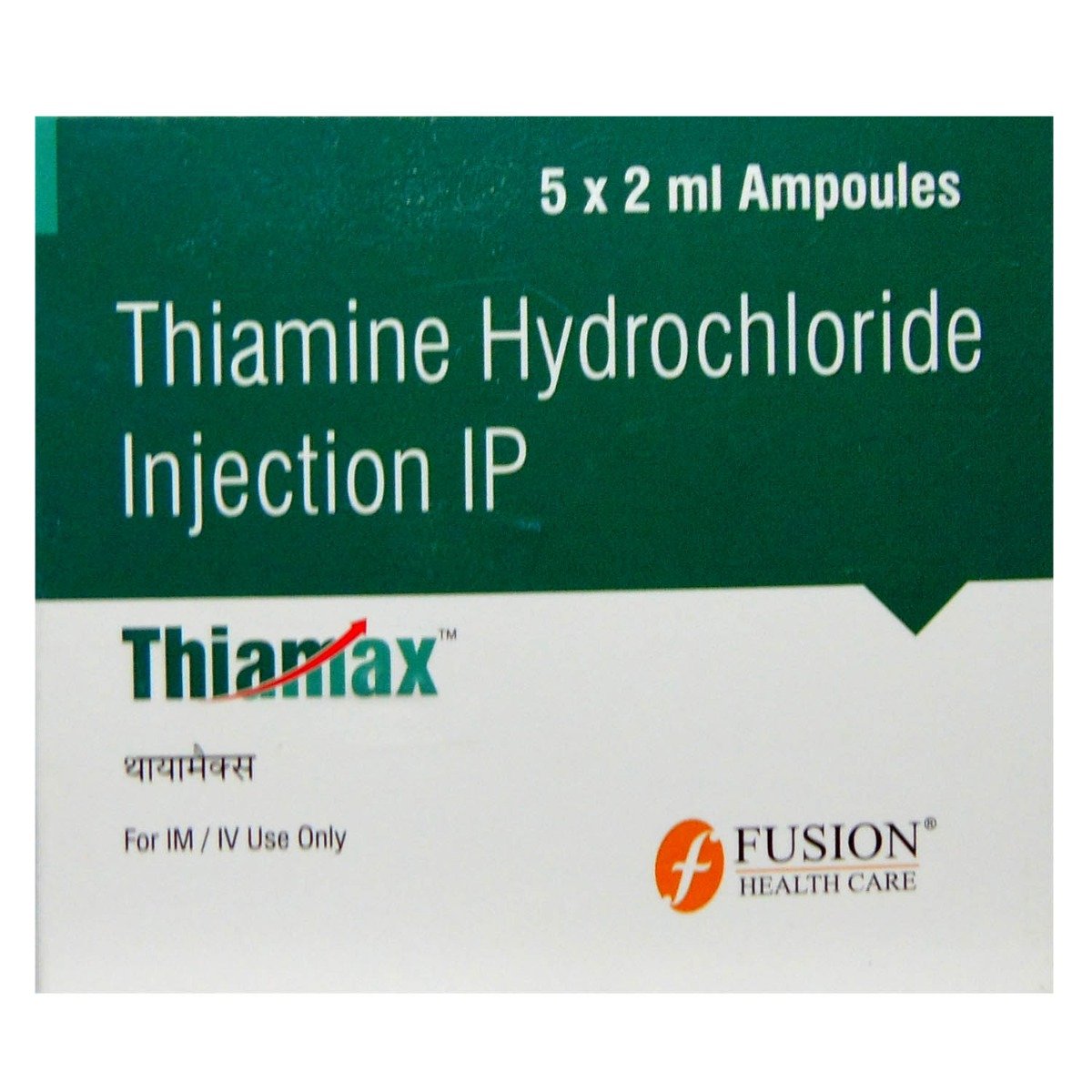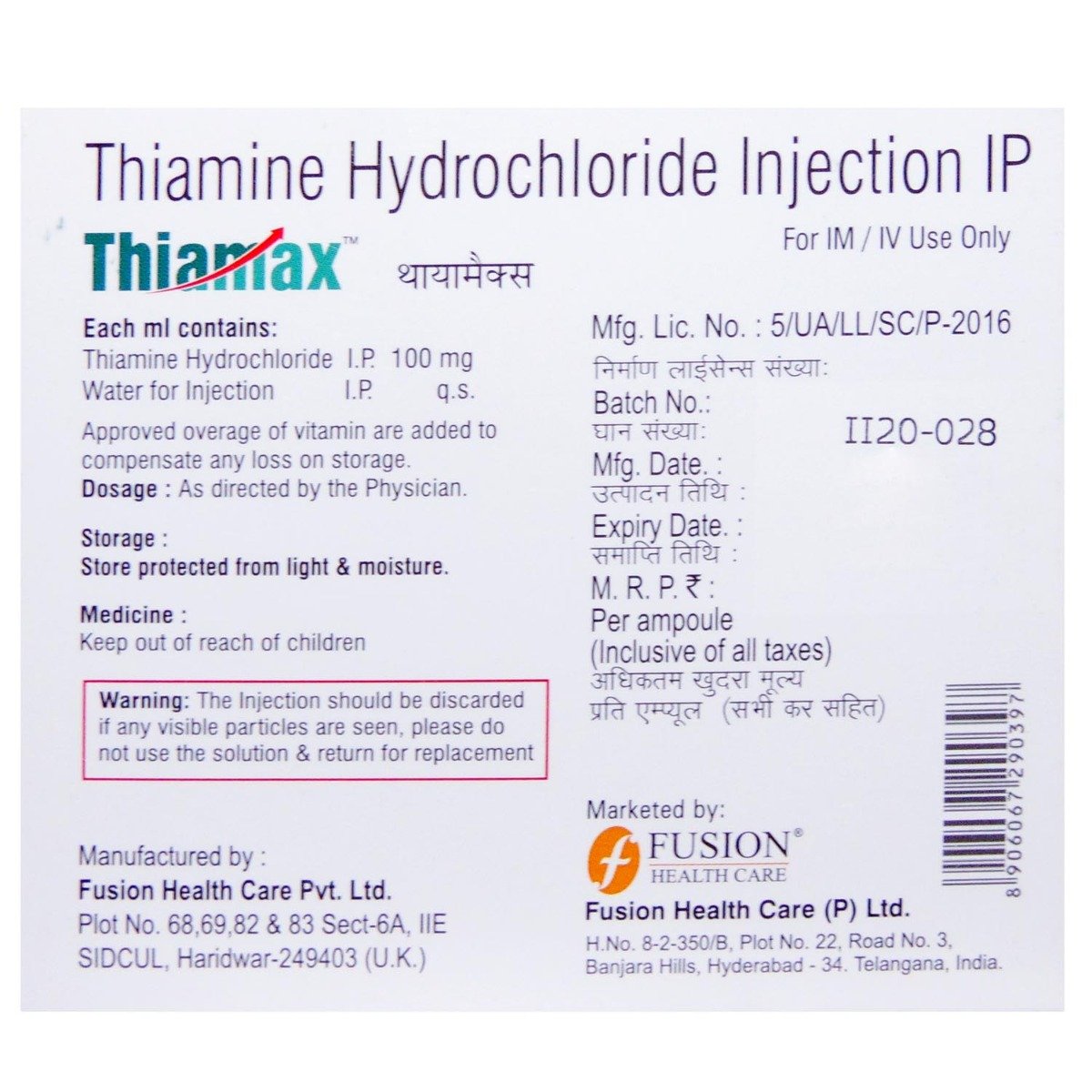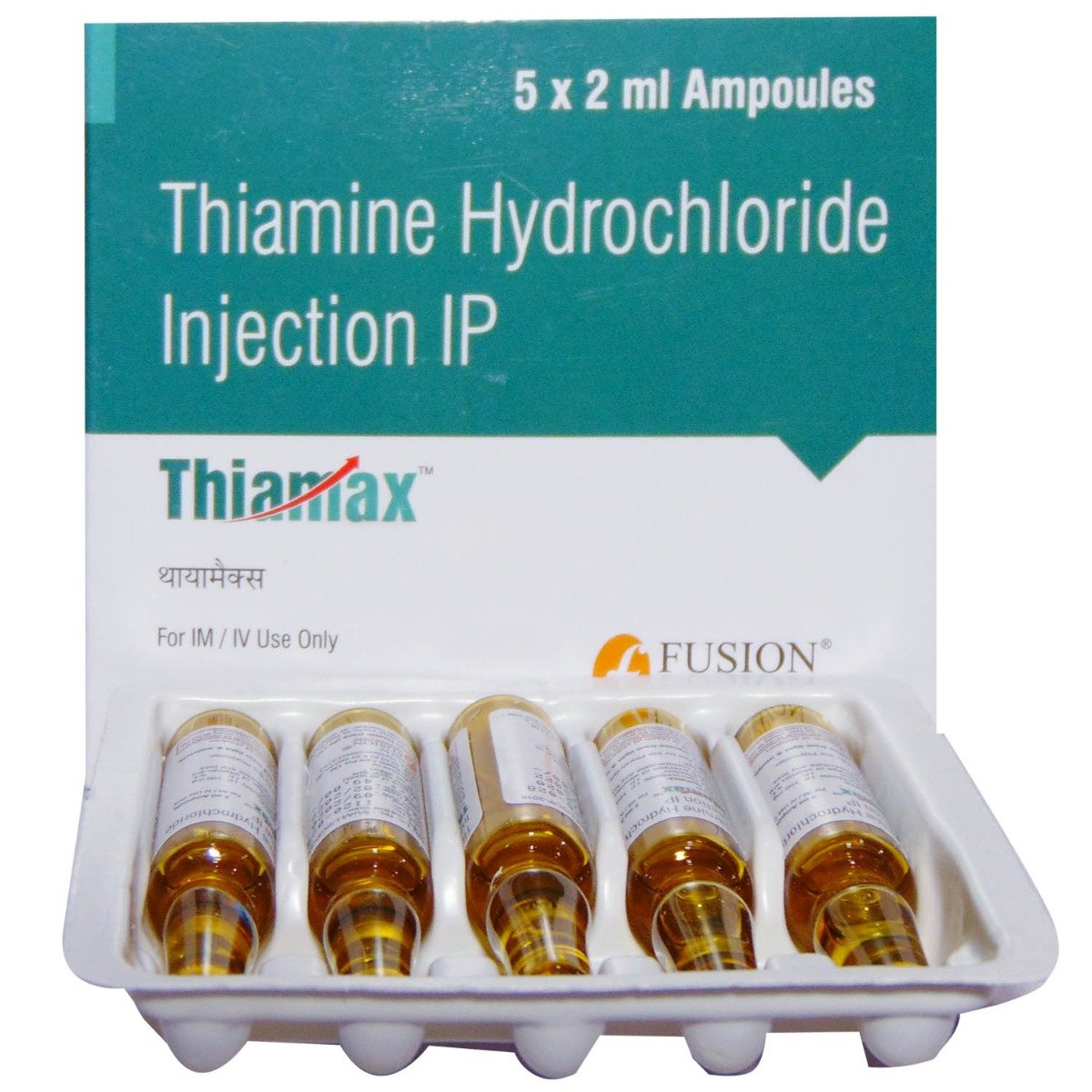Thiamax Injection 100Mg 2 ml
MRP ₹56
(Inclusive of all Taxes)
₹8.4 Cashback (15%)
Provide Delivery Location
Online payment accepted
 Prescription drug
Prescription drugWhats That
Composition :
Manufacturer/Marketer :
Consume Type :
Expires on or after :
Return Policy :
About Thiamax Injection 100Mg 2 ml
Thiamax Injection 100Mg 2 ml is a vitamin supplement that is used to prevent and treat thiamine deficiency or beriberi, a deficiency related to chronic alcoholism and Wernicke-Korsakoff syndrome. Thiamax Injection 100Mg 2 ml is also used when giving IV dextrose to individuals with marginal thiamine status to prevent the precipitation of heart failure.
Thiamax Injection 100Mg 2 ml includes Thiamine (Vitamin B1), which works by giving critical nutrients to the body. Thiamax Injection 100Mg 2 ml is also appropriate in patients with established thiamine deficit who are unable to take thiamine/vitamin B1 orally due to concurrent severe anorexia, malabsorption, nausea, or vomiting.
Thiamax Injection 100Mg 2 ml will be administered by a healthcare professional; do not self-administer. In some cases, Thiamax Injection 100Mg 2 ml may cause side effects such as weakness, nausea, restlessness, sweating, and a feeling of warmth. Most of these side effects do not require medical attention and will resolve gradually over time. However, if the side effects persist or worsen, consult a doctor.
Inform the doctor if you are allergic to any of the components in Thiamax Injection 100Mg 2 ml. Consult your doctor if you are pregnant or breastfeeding. Tell your doctor if you are taking supplements, herbal products, or other medicines. Please consult your doctor if you have any concerns regarding the usage of Thiamax Injection 100Mg 2 ml in children.
Uses of Thiamax Injection 100Mg 2 ml
Directions for Use
Key Benefits
Thiamax Injection 100Mg 2 ml belongs to the group of medicines called vitamins used to prevent and treat thiamine deficiency or beriberi, deficiency related to chronic alcoholism, and Wernicke-Korsakoff syndrome. Thiamax Injection 100Mg 2 ml is also used when giving IV dextrose to individuals with marginal thiamine status to prevent the precipitation of heart failure. It should be used when rapid restoration of thiamine is desired, as in infantile beriberi with acute collapse, Wernicke's encephalopathy (neurological condition due to thiamine deficiency), neuritis of pregnancy if vomiting is severe, or cardiovascular disease due to thiamine deficiency. Thiamax Injection 100Mg 2 ml is also indicated in patients with established thiamine deficiency who cannot take thiamine/vitamin B1 orally due to coexisting severe anorexia (eating disorder), malabsorption, nausea, or vomiting. Thiamax Injection 100Mg 2 ml contains Thiamine (Vitamin B1), which works by providing essential nutrients to the body.
Storage
Drug Warnings
Inform the physician if you are allergic to any components in Thiamax Injection 100Mg 2 ml. Consult your doctor if you are pregnant or if you are breastfeeding. Let your doctor know if you are taking other medicines, herbal products, or vitamin/mineral supplements.
Drug-Drug Interactions
Drug-Drug Interactions
Login/Sign Up
Coadministration of Patiromer with Thiamax Injection 100Mg 2 ml can lower the amount of Thiamine levels in the body, leading to low treatment results.
How to manage the interaction:
Taking Thiamine (vitamin b1) with Patiromer calcium together can possibly result in an interaction, but it can be taken if your doctor has advised it. Consult your doctor if your symptoms do not improve. Do not discontinue any medications without consulting your doctor.
Drug-Food Interactions
Drug-Food Interactions
Login/Sign Up
Diet & Lifestyle Advise
- Include fortified breakfast cereals, beans, lentils, green peas, sunflower seeds, and yoghurt.
- Eat a diet rich in thiamine-containing foods.
- Limit or avoid alcohol consumption.
- Avoid stress by doing meditation or yoga.
- Rest well, and get optimum sleep.
Side Effects of Thiamax Injection 100Mg 2 ml
- Weakness
- Nausea
- Restlessness
- Sweating
- A feeling of warmth
Habit Forming
Therapeutic Class
All Substitutes & Brand Comparisons
RX
Out of StockBeriwin Injection 30 ml
Care Vet Pharma
₹117
(₹3.51/ 1ml)
86% CHEAPERRX
Amintoz Injection 2 ml
Linux Laboratories Pvt Ltd
₹47
(₹21.15/ 1ml)
16% CHEAPERRX
Thimin 100 Injection 2 ml
Gopal Life Sciences
₹47
(₹21.15/ 1ml)
16% CHEAPER
Author Details
We provide you with authentic, trustworthy and relevant information
Drug-Diseases Interactions
Drug-Diseases Interactions
Login/Sign Up
FAQs
Disease/Condition Glossary
Thiamine deficiency/Beriberi: Thiamine deficiency, also known as beriberi, is a condition in which the body does not have enough thiamine/vitamin B1. It usually occurs due to alcoholism or poor diet. Symptoms include weakness, loss of appetite, swollen feet or ankles, shortness of breath, and pain in the limbs.
Wernicke-Korsakoff syndrome: It is a brain disorder due to a lack of vitamin B1 (thiamine). It occurs due to malnutrition or alcohol use disorder. Symptoms include confusion, ataxia (loss of muscle coordination), vision changes, and alcohol withdrawal.

Have a query?
Alcohol
Safe if prescribed
It is unknown if alcohol interacts with Thiamax Injection 100Mg 2 ml. Please discuss with your doctor if you have any concerns.
Pregnancy
Consult your doctor
If you are pregnant or planning pregnancy, inform your doctor before receiving Thiamax Injection 100Mg 2 ml. Your doctor may prescribe this medicine if the benefits outweigh the risks.
Breast Feeding
Consult your doctor
If you are breastfeeding, inform your doctor before receiving Thiamax Injection 100Mg 2 ml. Your doctor may prescribe this medicine if the benefits outweigh the risks.
Driving
Safe if prescribed
Thiamax Injection 100Mg 2 ml does not impact your ability to drive.
Liver
Consult your doctor
If you have a history of liver disease, inform your doctor before receiving Thiamax Injection 100Mg 2 ml.
Kidney
Consult your doctor
If you have a history of kidney disease, inform your doctor before receiving Thiamax Injection 100Mg 2 ml.
Children
Safe if prescribed
Thiamax Injection 100Mg 2 ml may be safe for children if prescribed by the doctor. Please discuss with your doctor if you have any concerns.












_0.jpg?tr=q-85)

